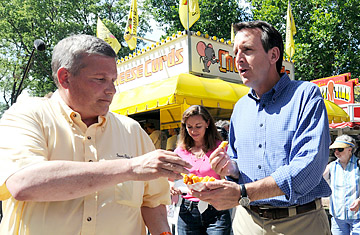
Either Tim Pawlenty is a huge fan of the corn dogs at the Iowa State Fair or the outgoing governor of Minnesota is seriously considering a run for the presidency in 2012. When Pawlenty crossed state lines on Aug. 11 to visit the Hawkeye State, it marked the fifth such trip he's made to the state over the past year. His latest visit included pit stops at the state fair (held each August) and fundraisers for three local Republican candidates. And he's not alone. The list of potential Republican candidates who have already visited Iowa includes Haley Barbour, Newt Gingrich, Bobby Jindal, Sarah Palin and Mitt Romney, among others.
Pawlenty's latest swing took place 539 days before the presidential election cycle officially kicks off for the Republicans — with the Iowa caucus on Feb. 1, 2012 — and 818 days before Election Day. No less a figure than the President of the United States has made note of the never ending campaign, but even as Barack Obama has railed against the endless cycle, he continues to perpetuate it. When he appeared on the set of The View on July 28 to tape an appearance, Obama said, "We shouldn't be campaigning all the time. There's a time to campaign, and there's a time to govern." But later that day, he hosted two fundraisers in Manhattan.
"You have no choice. Unless you are a sitting President, you have to start at least two years in advance," says Allan Lichtman, a history professor at American University and author of The Keys to the White House. "And Presidents have to campaign all the time anyway." It wasn't always this way. Since 1789, the amount of time it takes for a candidate to win the presidency has gone from none to more than two years. After he led the colonies to independence, George Washington headed the new country's Constitutional Convention and was anointed America's first President. Washington faced no serious electoral opposition, and he considered partisan campaigning a crass exercise beneath the dignity of a country's leaders, says Lichtman.
But with the unchallengeable standing of a George Washington impossible to replicate, political parties and conventions began to emerge as forums from which to tap the country's next leaders. "Campaigns were much more private and took place behind closed doors among elites," says Richard Norton Smith, a presidential historian at George Mason University. The country played by these rules well into the 20th century, though early departures from the smoke-filled-room model offered a hint of the modern extended campaign. Two years before the 1824 election, the Tennessee state legislature nominated an outsider for President: the state's upstart Senator (and War of 1812 hero) Andrew Jackson. After the 1824 election failed to produce an outright victor, the House of Representatives gave the presidency to John Quincy Adams. Without missing a beat, Jackson kicked off a revenge campaign, and four years later he finally won the day. Old Hickory, the nation's seventh President, became the first not to hail from Massachusetts or Virginia.
